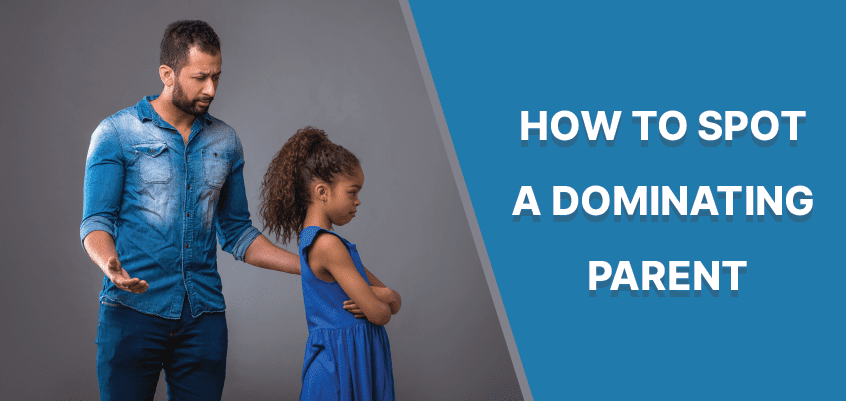INTRODUCTION
It is widely acknowledged that having a sense of autonomy and control is crucial for maintaining good mental health and well-being. Unfortunately, recent studies have uncovered that children raised by dominating parents encounter emotions of powerlessness and helplessness and reduced autonomy while making decisions in their lives.
The Dominating Parenting Style
“Dominant parent” generally refers to a parent with greater power, control, or influence over the family dynamic and decision-making processes. A dominating parenting style is characterized by high demands and strict rules without adequate attention to the child’s emotional needs. Such parents may prioritize obedience and conformity over their child’s emotional and social development and enforce regulations without considering the child’s individuality or emotions.
Children raised by dominating parents may have difficulty expressing themselves, forming healthy relationships, and developing a sense of autonomy and self-control. This can lead to feelings of anxiety, insecurity, and emotional repression and can negatively impact their mental health.
Research has shown that children raised by responsive parents tend to be more independent, confident, and better equipped to face life’s challenges. In contrast, those submitted by dominating parents may struggle with emotional regulation, have low self-esteem, and engage in risky behaviors.
Therefore, parents need to strive for a balance between being demanding and being responsive. Setting high expectations for a child while also being sensitive to their emotional needs can promote healthy emotional and social development, leading to positive outcomes in the long term. Parents can encourage their child’s emotional and social growth by providing a safe, nurturing, and supportive environment and helping them develop into confident and well-adjusted adults.
Unpacking the Traits of a Dominating Parent: Signs to Watch Out For
Several factors determine whether a parent is controlling, such as the type and way of control, level of power, and the child’s temperament and perception of the parent’s control.
Here are the main points about signs of controlling parents:
- Demand blind obedience and conformity
- Do not allow children to participate in or question the parents’ decisions
- Do not let their child make their own decisions or encourage choice and independence
- Dictate every aspect of the child’s life
- “Help” the child without being asked and discipline through punishment and coercion
- Believe children should be seen but not heard and criticize any choices their child makes
- Have unrealistically high standards and expectations and many rigid rules
- Arbitrarily add family rules for more control
- Lack empathy for their child and refuse to see things from their child’s perspective
- Believe they are always right and always tell you what to do
- They do not respect their child’s privacy and are emotionally immature.
It’s important to recognize these signs and seek help if needed.
Consequences of Dominating Parenting Style on Children:

- Children may have less social competence and struggle to maintain positive relationships.
- They may have lower self-esteem and feel insecure about their abilities and self-worth.
- The child may be more prone to depression and anxiety due to the pressure and lack of emotional support.
- They may rebel against controlling behaviour, leading to a strained relationship between the parent and child.
- The child may also engage in escapist behaviour, such as withdrawing or seeking comfort in substances or activities, to cope with the stress and lack of autonomy.
Parents need to recognize the impact their parenting style can have on their child’s emotional and social development. Parents can benefit from learning more about alternative approaches to parenting, such as authoritative or responsive parenting styles, that encourage open communication and mutual respect and promote their child’s independence and individuality. Parents can create a safe and nurturing environment for their children, promote positive emotional and social growth, and help them develop into confident and well-adjusted adults.
Breaking the Cycle of Dominating Parent
If you have been a dominating parent, seeking professional help is the best way to support your child. Children often cope with dominating parenting styles by either complying compulsively or displaying oppositional defiance, neither of which benefits them. Being a grown-up with a dominating parent can make you feel disrespected, and unfortunately, research indicates that dominating parenting behavior is unlikely to change over time. If you suffer from depression or anxiety, it’s crucial to seek professional help as soon as possible. When looking for therapy, try to find a therapist specializing in relational therapy with experience in dominating parenting issues. Taking proactive steps to manage the situation can help parents and children navigate the challenges of maintaining parenting, improve their emotional well-being, and promote healthy relationships.
Conclusion
Dominating parenting can impact a child’s emotional, social, and psychological development. Parents must recognize the signs of controlling behavior and seek professional help to address underlying issues. Parents can create a nurturing and supportive environment that fosters positive growth and development by promoting independence and autonomy, respecting a child’s needs and emotions, and encouraging healthy communication.
REFERENCES
1] P. Li, “Controlling parents – 20 signs and why they are harmful,” Parenting For Brain, 09-Oct-2020. [Online]. Available here: . [Accessed: 02-May-2023].
[2] B. Sethi, “Controlling parents – types, signs and how to deal with them,” FirstCry Parenting, 18-Dec-2021. [Online]. Available here: . [Accessed: 02-May-2023].
[3] L. Kuczynski and G. Kochanska, “Development of children’s noncompliance strategies from toddlerhood to age 5,” Dev. Psychol., vol. 26, no. 3, pp. 398–408, 1990.
[4] R. L. Simons, L. B. Whitbeck, R. D. Conger, and C.-I. Wu, “Intergenerational transmission of harsh parenting,” Dev. Psychol., vol. 27, no. 1, pp. 159–171, 1991.









